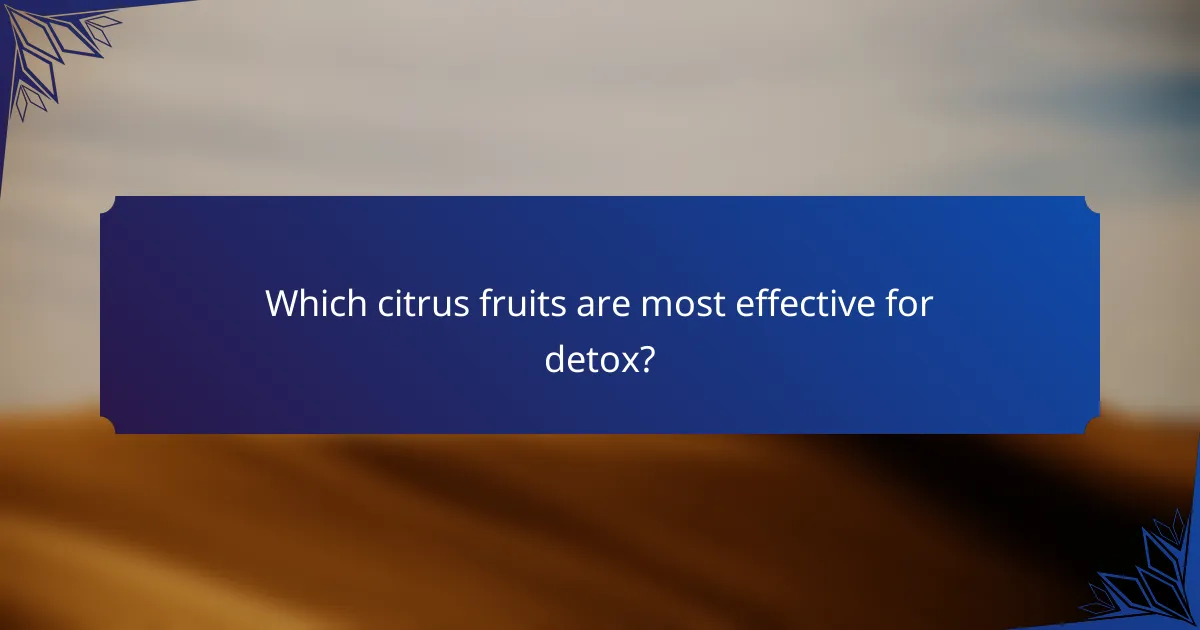Citrus fruits are not only delicious but also play a crucial role in detoxification by supporting liver function and aiding in the elimination of toxins. Packed with vitamins, antioxidants, and fiber, they offer numerous health benefits, including improved immunity and skin health. Additionally, their versatility in culinary applications allows them to enhance flavors and add freshness to a wide range of dishes.

How do citrus fruits aid detoxification?
Citrus fruits play a significant role in detoxification by supporting liver function and promoting the elimination of toxins from the body. Their high water content and essential nutrients enhance hydration and facilitate the body’s natural cleansing processes.
High vitamin C content
Citrus fruits are renowned for their high vitamin C levels, which are crucial for detoxification. Vitamin C aids in the production of glutathione, a powerful antioxidant that helps the liver detoxify harmful substances.
Consuming citrus fruits like oranges, lemons, and grapefruits can provide a substantial boost to your daily vitamin C intake, often exceeding the recommended daily allowance with just one serving. This vitamin also supports immune function, further enhancing overall health during detoxification.
Natural diuretic properties
Citrus fruits possess natural diuretic properties, which help increase urine production and promote the excretion of waste products. This can assist in flushing out toxins and excess fluids from the body.
Lemons and limes, in particular, are effective in this regard. Adding lemon juice to water can enhance hydration while promoting diuresis, making it an excellent choice for those looking to support their detox efforts.
Rich in antioxidants
Citrus fruits are rich in antioxidants, which combat oxidative stress and protect cells from damage. These antioxidants, including flavonoids and carotenoids, contribute to the detoxification process by neutralizing free radicals.
Incorporating a variety of citrus fruits into your diet can maximize antioxidant intake. For example, a mix of oranges, grapefruits, and tangerines not only provides diverse flavors but also a broad spectrum of beneficial compounds that support overall health and detoxification.

What are the health benefits of citrus fruits?
Citrus fruits offer numerous health benefits, including enhanced immunity, improved skin health, and support for heart health. Rich in vitamins, antioxidants, and fiber, these fruits play a vital role in promoting overall well-being.
Boost immune system
Citrus fruits are well-known for their ability to boost the immune system, primarily due to their high vitamin C content. This essential nutrient helps stimulate the production of white blood cells, which are crucial for fighting infections.
Incorporating citrus fruits like oranges, lemons, and grapefruits into your diet can enhance your body’s defenses, especially during cold and flu seasons. Aim for at least one serving of citrus daily to maintain optimal immune function.
Improve skin health
The antioxidants found in citrus fruits, particularly vitamin C, are beneficial for skin health. They help combat free radicals, which can lead to premature aging and skin damage.
Regular consumption of citrus can improve skin texture and brightness. Consider adding citrus juices or slices to your meals, or using them in skincare routines for their revitalizing properties.
Support heart health
Citrus fruits contribute to heart health by providing essential nutrients that help lower blood pressure and cholesterol levels. The fiber and flavonoids in these fruits can improve overall cardiovascular function.
To support heart health, include a variety of citrus fruits in your diet, such as oranges, lemons, and limes. Aim for at least two servings per day to reap the cardiovascular benefits.

How can citrus fruits be used in cooking?
Citrus fruits are versatile ingredients in cooking, enhancing flavors and adding freshness to a variety of dishes. They can be used as flavoring agents, in beverages, and even for preservation methods, making them essential in many culinary applications.
Flavoring agents in dishes
Citrus fruits like lemons, limes, and oranges are excellent flavoring agents that can elevate both savory and sweet dishes. Their juices and zests add brightness and acidity, which can balance rich flavors. For example, a squeeze of lemon juice can enhance the taste of grilled fish or roasted vegetables.
When using citrus as a flavoring, consider the balance of acidity and sweetness in your dish. A general rule is to start with a small amount of juice or zest and adjust according to taste. Pairing citrus with herbs like cilantro or basil can create refreshing flavor profiles.
Ingredients in beverages
Citrus fruits are commonly used in beverages, providing a refreshing taste and natural sweetness. Freshly squeezed orange juice, lemonade, and lime-infused cocktails are popular examples. The acidity of citrus helps to enhance the overall flavor of drinks, making them more enjoyable.
When preparing beverages, consider using a mix of citrus fruits for a more complex flavor. For instance, combining lemon and lime juice can create a zesty punch. Always use fresh citrus for the best flavor, and experiment with different ratios to find your preferred balance.
Preservation methods
Citrus fruits can also play a role in food preservation due to their high acidity, which inhibits the growth of bacteria. They are often used in marinades and pickling solutions to extend the shelf life of various foods. For example, lemon juice can be used to preserve the color and freshness of cut fruits and vegetables.
To effectively use citrus for preservation, ensure that the food is fully submerged in the citrus solution. A common method is to mix equal parts of citrus juice and water for a quick soak. This technique not only preserves but also adds flavor to the food being preserved.

What supplements enhance citrus fruit benefits?
Supplements that enhance the benefits of citrus fruits include citrus bioflavonoids and vitamin C capsules. These supplements can help boost the antioxidant properties and overall health benefits associated with consuming citrus fruits.
Citrus bioflavonoid supplements
Citrus bioflavonoids are plant compounds found in citrus fruits that can enhance the absorption of vitamin C and provide additional antioxidant effects. These supplements may help improve circulation, reduce inflammation, and support immune function.
When considering citrus bioflavonoid supplements, look for products that contain a blend of different bioflavonoids, such as hesperidin and quercetin. A typical dosage ranges from 500 mg to 1,000 mg per day, but it’s advisable to consult a healthcare provider for personalized recommendations.
Vitamin C capsules
Vitamin C capsules are a popular supplement that can complement the intake of citrus fruits by providing a concentrated source of this essential nutrient. Vitamin C is crucial for collagen production, immune support, and antioxidant protection.
For adults, a daily dosage of vitamin C typically ranges from 500 mg to 1,000 mg, depending on dietary intake and health goals. It’s best to choose a high-quality supplement that is free from artificial additives and allergens. Always consult with a healthcare professional before starting any new supplement regimen.

Which citrus fruits are most effective for detox?
Lemon, grapefruit, and orange are among the most effective citrus fruits for detoxification due to their high vitamin C content and natural antioxidants. These fruits support liver function, enhance digestion, and help eliminate toxins from the body.
Lemon
Lemons are renowned for their detoxifying properties, primarily due to their high levels of citric acid and vitamin C. They stimulate the liver, promoting bile production, which aids in digestion and fat breakdown.
Incorporating lemon into your diet can be simple; adding fresh lemon juice to water, salads, or seafood enhances flavor while providing detox benefits. Aim for the juice of half a lemon daily for optimal effects.
Grapefruit
Grapefruit is another powerful citrus fruit known for its detox capabilities. It contains naringenin, a compound that helps regulate blood sugar levels and enhances liver function, making it effective for detoxification.
Consuming half a grapefruit before meals may help reduce appetite and improve metabolic health. However, be cautious if you’re on certain medications, as grapefruit can interact with various drugs.
Orange
Oranges are not only delicious but also packed with fiber and vitamin C, which support detoxification. The fiber aids digestion and promotes regular bowel movements, essential for eliminating toxins.
Incorporating whole oranges into your diet is beneficial; aim for one medium orange daily. Fresh orange juice can also be a refreshing option, but be mindful of sugar content and opt for freshly squeezed varieties without added sugars.

How to incorporate citrus fruits into a daily diet?
Incorporating citrus fruits into your daily diet can enhance your overall health and add refreshing flavors to meals. Simple methods include adding them to drinks, snacks, and dressings, making it easy to enjoy their detoxification benefits and nutritional value.
Morning detox drinks
Starting your day with a citrus-based detox drink can boost hydration and provide essential vitamins. Consider mixing freshly squeezed lemon or orange juice with warm water to kickstart digestion and metabolism.
For added benefits, infuse your detox drink with ingredients like ginger or mint. These combinations not only enhance flavor but also support detoxification and improve overall wellness.
Healthy snacks
Citrus fruits make excellent healthy snacks due to their refreshing taste and low-calorie content. Slices of grapefruit or orange can be enjoyed on their own or paired with yogurt for a nutritious treat.
Another option is to create a citrus fruit salad, combining various fruits like tangerines, lemons, and limes. This colorful mix can satisfy sweet cravings while providing a boost of vitamins and antioxidants.
Salad dressings
Citrus juices can elevate salad dressings, adding brightness and acidity. A simple dressing can be made by whisking together lemon juice, olive oil, salt, and pepper for a quick and flavorful option.
For a more complex dressing, consider adding honey or mustard to the citrus base. This combination can enhance the taste of salads while providing a healthy alternative to store-bought dressings high in preservatives and sugar.
